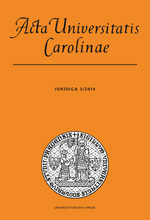Zákaz diskriminace v pracovněprávních vztazích z důvodu státní příslušnosti
Prohibition of Discrimination on the Grounds of State Citizenship in Employment Relations
Author(s): Věra ŠtangováSubject(s): Law, Constitution, Jurisprudence
Published by: Univerzita Karlova v Praze, Nakladatelství Karolinum
Keywords: prohibition of discrimination; employment relations; free movement of workers; transitional provisions; access to labour market; performance of legal professions
Summary/Abstract: The right of citizens of the European Union to move freely and to establish in any EU Member State is one of the pillars of EU integration. Every state citizen of a Member State of the EU has the right to perform work for remuneration in the territory of another Member State in compliance with the legislation of that particular Member State and under the same conditions as citizen of that State. Discrimination is prohibited in employment. The prohibition of discrimination covers the creation, content and termination of individual employment relationship, i.e. it applies throughout its overall duration. The non-discrimination rule also applies to remuneration, requalification measures and social and tax advantages. State citizenship must not form a ground for discrimination where working conditions in their widest sense are considered. A more detailed definition of rights of workers is stipulated in Directive of the European Parliament and of the Council no. 2004/38 EC on the right of citizens of the Union and their family members to move and reside freely within the territory of the Member States, and in Regulation no. 492/2011 on freedom of movement for workers within the Union. Direct discrimination is prohibited within the framework of free movement of persons of the Union; however it may be justified in a particular case through objective exceptions stipulated in Art. 45 (3) of the Treaty on the Functioning of the European Union, i.e. as part of the reservation of public order, public safety and health protection. The second exception to the free movement of workers applies to employment in public administration. A Member State may reserve an access to employment for their own citizens only with respect to positions in civil service where their holders are responsible for the execution of competences of the state. The third exception to the free movement of workers principle consists of exigent general interests as recognized by the Court of Justice of the EU in its judgments, for example preserving national and cultural values. Considering the practice of traditional legal professions within the EU, there is autonomous regulation applicable only to lawyers (i.e. members of the Bar). The adoption of Directive of the European Parliament and the Council no. 98/5 EC helped to clarify the concept of permanent provision of legal services in a Member State other than that in which the law degree was obtained by the provider of legal services. The situation differs with respect to notaries and their possibility to practise in other Member States. There is an important factor to be considered, namely the extent to which notaries in the respective host Member State take part in the execution of public powers. Legal orders of EU Member States are essentially based on the principle that the performance of the office of a notary is the performance of public powers and that state citizenship is one of basic requirements for that performance.
Journal: Acta Universitatis Carolinae Iuridica
- Issue Year: 60/2014
- Issue No: 3
- Page Range: 35-44
- Page Count: 10
- Language: Czech

